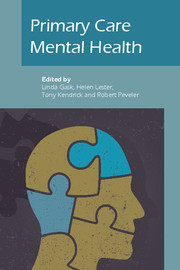Book contents
- Frontmatter
- Contents
- List of figures, tables and boxes
- List of contributors
- Preface
- Part I Conceptual basis and overarching themes
- Part II Clinical issues
- Part III Policy and practice
- 24 Mental health promotion
- 25 Improving the quality of primary care mental health: what does and does not work?
- 26 Psychological treatments
- 27 Collaborative care and stepped care: innovations for common mental disorders
- 28 The role of practice nurses
- Part IV Reflective practice
- Epilogue: Racing pigeons and rolling rocks: reflections on complex problems in primary care
- Index
24 - Mental health promotion
from Part III - Policy and practice
Published online by Cambridge University Press: 02 January 2018
- Frontmatter
- Contents
- List of figures, tables and boxes
- List of contributors
- Preface
- Part I Conceptual basis and overarching themes
- Part II Clinical issues
- Part III Policy and practice
- 24 Mental health promotion
- 25 Improving the quality of primary care mental health: what does and does not work?
- 26 Psychological treatments
- 27 Collaborative care and stepped care: innovations for common mental disorders
- 28 The role of practice nurses
- Part IV Reflective practice
- Epilogue: Racing pigeons and rolling rocks: reflections on complex problems in primary care
- Index
Summary
Attempting a definition of mental health promotion
Defining mental health promotion (MHP) is at least as difficult a task as defining health promotion. In order to define it you need to be clear about where you sit in terms of how you define mental health. Confusingly, as with health generally, we define our mental health services as a place where we treat mental ill health. Unsurprisingly, the public still tend to think of mental health in terms of schizophrenia and depression. The World Health Organization (WHO), in defining ‘health’ in 1947, included mental health as part of an attempt at a holistic vision of health. In 2001, the WHO published the following definition of positive mental health:
a state of well-being in which the individual realises his or her own abilities, can cope with normal stresses of life, can work productively and fruitfully and is able to make a contribution to his or her own community. (WHO, 2001)
This definition, while capturing what many may view as good mental health, reflects the same arguments as physical well-being versus disability and leaves the survivors of mental health issues, to some extent, outside of the definition. Health and illness, however, can coexist. They are mutually exclusive only if health is defined in a restrictive way as the absence of disease (Sartorius, 1990). Lay beliefs about health vary across culture, gender, age and social circumstance; for example, young people in high-income countries tend to think in terms of fitness or healthy diet, older people in terms of inner strength and coping with life's challenges. However, the definitions of mental health we routinely use are culturally skewed, individualised and expert-led versions of what it means to be mentally healthy. For example, what these Westernised definitions fail to take account of might be the reliance on fate or a deity, or on some other belief system present in other cultural representations.
- Type
- Chapter
- Information
- Primary Care Mental Health , pp. 351 - 365Publisher: Royal College of PsychiatristsPrint publication year: 2009



